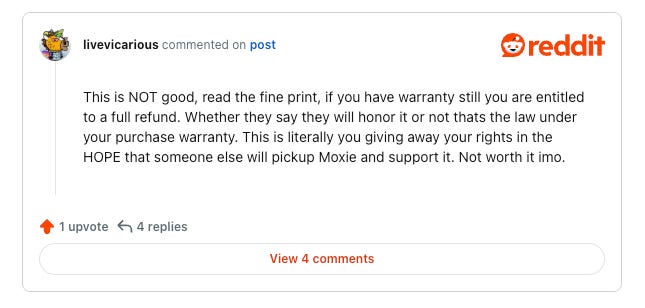Moxie Libre! Push To Open Source May Keep Moxie Robot Working
Embodied technicians are working on open source software to keep the Moxie robots working after its cloud servers shut down. And: senators call out automakers for opposing right to repair.
We wrote last week about Moxie, the $800 emotional support robot at risk of going dark after its maker, Embodied, announced it was declaring bankruptcy and shutting down the servers that thousands of robots in homes across the globe relied on to function.
That news led to an impassioned response from Moxie owners, who voiced their dismay on platforms like Reddit and implored the company to find a way to keep its Moxie robots working even after it closed its doors.
Like what you’re reading? Spread the word!
Well, it looks as if Moxie’s founders had their ears to the ground. In a statement sent to customers and posted to the company’s LinkedIn page on Friday, December 20th, Embodied said that a group of “former technical team members” from the company was in the process of developing a version of its server software, dubbed “OpenMoxie,” that customers could run locally on a computer they own. “Once available, this community-driven option will enable you (or technically inclined individuals) to maintain Moxie’s basic functionality, develop new features, and modify her capabilities to better suit your needs—without reliance on Embodied’s cloud servers,” the statement said. The news was first reported by Ars Technica.

In the meantime, the company pushed out an over the air (OTA) software update for the Moxie robots that would enable them to connect to- and take commands from a locally run server once the OpenMoxie software becomes available. Customers were urged to install the OTA before Embodied’s cloud servers cease operation.
“Once the cloud servers stop working you will not be able to update your robot,” Embodied warned. “This update will prepare your device for potential local operation in the future even after the cloud servers stop working.”
The company said it is working to develop a “community-driven future” for the Moxie robot.
“We are providing these steps in the spirit of giving you every available option to extend Moxie’s usefulness, reflecting our continued dedication to serving the community that has grown around her,” the statement reads.
Embodied said that, in addition to the OpenMoxie software, it intends to provide instructions for its customers to access and install it, open source “all necessary code and documentation” so that independent developers or community members can “maintain and enhance Moxie independently.”
However, that freedom will come at a price. “Please understand that Embodied cannot provide ongoing support of these efforts after it is released, and that the project will be community-driven and maintained without our direct involvement,” the statement reads. Embodied’s statement makes clear that customers who install the latest OTA update will not enjoy any protections under the company’s warranty and any software and updates it provides are “as is” and that it falls to customers to “assume full responsibility for implementing, maintaining and operation the solution.”
Those conditions had Moxie users in a subreddit channel devoted to the robot sounding alarms that the open source push may be a play to get customers with active warranties to surrender their rights to a full refund from Embodied.
“This is NOT good, read the fine print, if you have warranty (sp) still you are entitled to a full refund,” wrote a user with the handle livevicarious in the /MoxieRobot subreddit on December 20th.
However, other subreddit subscribers pointed out that, with Embodied declaring bankruptcy, customers seeking a refund were destined to wait in line behind Embodied’s other creditors as a bankruptcy judge oversaw the liquidation of the company’s assets. They were unlikely to get a full refund - if anything at all.
“If you want to get a $50 check four years from now after the class actions, go nuts,” wrote the user z4579a. After installing the update, they wrote to say that the Moxie robot was operating normally.
The effort by Embodied parallels those of other companies. In 2018, employees of pioneering Pebble smart watch launched a similar effort after the company was acquired by FitBit in 2016 and its servers subsequently targeted for shut down. The resulting Rebble Alliance (Rebble.io) took on the job of maintaining the Pebble watch code, which became open source, and has maintained the devices since.
Owners of Fisker electric vehicles likewise banded together to form the Fisker Owners Association and negotiate with that company’s creditors for access to software needed to maintain and repair the vehicles after the company declared bankruptcy earlier this year.
While the future for the Moxie robots remains unclear, the latest moves by Embodied have at least given owners of the popular AI-powered robots hope that they will be able to continue using and benefitting from the technology.
“This is the only way we have to keep live Moxie” wrote the /MoxieRobot subscriber with the handle Affectionate_Comb569.
😠 Got a repair complaint? Tell us about it!
Do you have a complaint about a manufacturer who is blocking your effort to repair your product? The Repair Coalition wants to hear about it! Use the link below to talk about the repair obstacles you’ve encountered.
Other News
Bipartisan US Senators hammer auto industry for fighting right to repair
A bipartisan group of U.S. Senators is calling automakers for their staunch opposition to new laws that guarantee owners and independent repair professionals the right to repair vehicles, The Drive reports. U.S. Senators Elizabeth Warren (D-Mass.), Josh Hawley (R-Mo.), and Jeff Merkley (D-Ore.) sent critical letters to major automakers, accusing them of prioritizing profits over consumer rights and affordability. Proposed legislation like the REPAIR Act have bipartisan support in Congress and give consumers access to car parts, services, and personal vehicle data, challenging automakers’ gatekeeping practices around repair and maintenance. Currently, independent outlets provide 70% of car parts and services, while OEM dealerships are often criticized for high prices and poor service. Automakers claim cybersecurity risks in sharing data with repair shops but monetize consumer data themselves, the senators wrote. Automakers have until January 6 to answer senators’ questions about data practices, cybersecurity breaches, and anti-right-to-repair lobbying expenses. (Read more…)
After defeat with Defense Authorization Act, Warren and Glusenkamp-Perez push military right to repair law
Senator Elizabeth Warren (D-MA) and Rep. Marie Glusenkamp Perez (D-WA) introduced legislation last week to give the U.S. military the “right to repair” its equipment after a similar proposal was removed from the final version of the must-pass defense policy package.
The bill — introduced on Dec. 12 b — requires defense contractors to provide military personnel with the ability to service their hardware and remove manufacturer-imposed restrictions that often limit or block non-provider repairs.
In recent decades, DOD contracts with equipment providers have included provisions that limit the Pentagon’s ability to repair purchased equipment, including limitations on sharing repair information and technical data needed to do repairs, which are labeled as protected “intellectual property” In a statement, the lawmakers said their bill gives the Defense Department “the tools to access the materials needed to maintain the military’s own equipment and directs DOD to use those tools to reduce sustainment costs, improve military readiness and build service member skills needed in future possible austere environments.” (Read more…)
🚴 Tell Peloton: No ‘activation’ fees for secondhand sales!
Illinois PIRG is calling on consumers to write to the luxury exercise equipment maker Peloton to urge the company to abandon its newly-enacted policy of charging consumers a $95 activation fee for Peloton exercise bikes purchased secondhand . The practice drives up waste and costs while eroding ownership rights, PIRG warns.
Video: John Deere Exposed: Why farmers are fighting back
The YouTubers Major Machinery have an interesting video that digs into some of agricultural equipment maker John Deere's controversial practices and how they affect farmers in the U.S. and around the world. The video explores Deere’s restrictive practices regarding machinery maintenance and repair and how those restrictions have led to skyrocketing maintenance costs, fueling backlash against Deere and corporate control generally, and giving life to a growing movement to reclaim fair farming practices.
With New Year, Oregonians get a right to repair their stuff
2025 will start of strong for the right to repair movement, as one of the nation’s strongest state right to repair laws takes effect on January 1st. Oregon's "Right to Repair" law (Senate Bill 1596), which was signed into law by Governor Tina Kotek in March requires manufacturers to provide tools, parts, and information for electronic device repairs.
The law is intended to lower repair costs for consumers by creating more repair options, and reducing the reliance on expensive authorized services. By extending device lifespans and simplifying repairs, the law also seeks to reduce electronic waste. Under the law, independent repair shops will get equal access to resources, enabling them to compete with authorized service providers and offer lower repair prices. (Read more…)
Maine’s auto right to repair law set to take effect…kind of
January 5th marks the date that Maine’s automotive right to repair law takes effect. But as Ratchet and Wrench notes, there are still lingering questions about how the law will be implemented making it unlikely that Mainers will enjoy their auto right to repair. The 2023 ballot initiative - which passed with approval from more than 80 percent of voters - provided one year to establish a standardized and independent data platform for all automotive makes and models. To comply with the law, the Maine Attorney General assembled an Automotive Right to Repair Working Group to suggest implementation strategies for establishing such a service. But the group's recommendations are not due until February 2025, after the law's effective date. Absent an independent entity or standardized access platform, there is no system in the near term to enforce or administer the law, an analysis by Seyfarth Shaw LLP concludes, putting the Maine law “in flux.” (Read more…)




